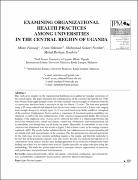| dc.contributor.author | Miiro, Farooq | |
| dc.date.accessioned | 2018-04-24T15:18:18Z | |
| dc.date.available | 2018-04-24T15:18:18Z | |
| dc.date.issued | 2017 | |
| dc.identifier.citation | Farooq, M ... et al (2017). Examining organizational health practices among universities in the central region of Uganda. Journal of Positive Management, 8(2), 69-86. | en_US |
| dc.identifier.issn | 2083-103X | |
| dc.identifier.issn | 2392-1412 | |
| dc.identifier.uri | http://hdl.handle.net/20.500.12309/522 | |
| dc.description.abstract | This study gives insights on the organizational health practices applied in Ugandan universities of
the central region. The paper examined four subdimensions of the construct through the use of the
data obtained from eight hundred twenty (N=820) randomly selected sample of volunteers from the
six universities that have been in existence for the last fifteen (15) years. The data were gathered
using a 25- items adopted and adapted from the previous studies reviewed, a Likert scale ranging
from strongly disagree to strongly agree (1 – 5) was used based on by Keller and Price conception
of the construct. Confirmatory Factor analysis a component of structural equation modelling was
employed to analyze the four subdimensions of the construct organizational health. The research
findings of the empirical cross section survey reflected that there is a relationship between the
four factor subdimensions; culture and climate, control and coordination, innovation/invention and
accountability even though they are all distinct in nature. Meanwhile, accountability as one of the
construct was eliminated from the results in figure 2 due to lower scores in the average variance
explained (AVE). The results further exhibited that the four subdimensions of organizational health
are reliable and valid measurements of the construct. The data generated was deemed appropriate
for the study since structure equation modelling requires a big sample, and fitted the model due to
the fact that all the parameter estimates were met. Lastly, the data was analysed through the use of
confirmatory factor analysis and the study findings generated are an extension of the previous study
findings since there was no similar study done in Uganda especially on higher education using this
methodology. The study has greater implications to managers towards improvement of university
staff performance and institutional transformation. | en_US |
| dc.language.iso | en | en_US |
| dc.publisher | Journal of Positive Management | en_US |
| dc.subject | Organizational health | en_US |
| dc.subject | Culture and climate | en_US |
| dc.subject | Innovation and Invention | en_US |
| dc.subject | Accountability | en_US |
| dc.subject | University | en_US |
| dc.subject | Uganda | en_US |
| dc.subject | Health practices | en_US |
| dc.title | Examining organizational health practices among universities in the central region of Uganda | en_US |
| dc.type | Article | en_US |

